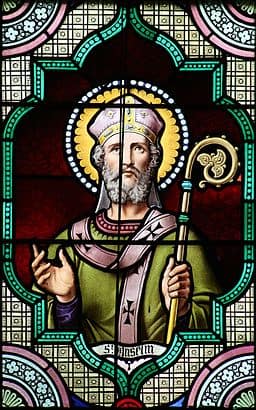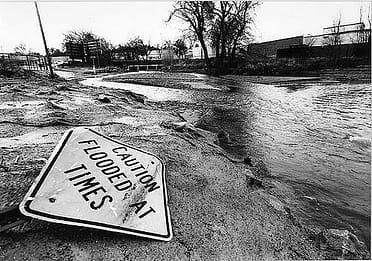Believers in God or a Godly figure of any religion principally believe God is both omnipotent and benevolent. Thus He sees all and only believes in good, but how could this be when an abundance of evil exists in a far from perfect world? Would God not care enough to rid of all evil to end the suffering of individuals He created as his children?
This article will explore the many theories of how evil could exist in a world believed by many to have been created by a “perfect” Godly figure, and whether a God actually exists.
What is Evil?
First, the concept of evil must be established. Evil is commonly broken down into two categories: a broad concept and a narrow concept. Todd Calder, an assistant professor of philosophy claims in The Concept of Evil, “The broad concept picks out any bad state of affairs, wrongful action, or character flaw.” This broad concept is further broken down into “natural evil and moral evil.” Natural evil can be seen in the event of a natural disaster such as a hurricane or tornado, while moral evils “result from the intentions or negligence or moral agents” seen in murder or lying.
The narrow concept of evil “picks out only the most morally despicable sorts of actions, characters, events, etc.” Thus the narrow concept of evil is focused strongly on human’s actions and our perception of morality. Friedrich Nietzsche, a German philosopher argues the narrow concept of evil is, “a problem we brought on ourselves, by inventing moral categories that don’t reflect the ways of the natural world” according to Rollo Rimog.
Causes of Death
A great number of people die annually and a very minimal number die naturally from old age. According to WHO (World Health Organization), the top 10 causes of death in the world annually are 9/10 health issues with the exception of road injuries. All of these could be avoided with the power of God, if He actually was omnipotent, all powerful, and benevolent, which raises the question as to: Does a God really exist, and if so is He really omnipotent and benevolent?
To answer this, we will look at some different philosophical theories relating to the issue of God and evil not belonging together in the same world (with our current understanding of how these two “ideas” function).
The Ontological Arguments

Anselm of Canterbury Image from Wikimedia [CC0]
Thus Anselm deductively proved God’s existence through the deductive reasoning of knowing God is the greatest thing one can imagine. From this he proved the two ways something can exist; in one’s imagination, or in physical existence. Next, he claimed things in existence are always better than things only within one’s imagination. Therefore, if God only existed in one’s imagination, He wouldn’t be the greatest thing someone could think of, because a God in reality would surely be better. “Therefore, God must exist in reality.”
But many were not satisfied with this explanation because Anselm: Ontological Argument for God’s Existence claims, “The prepositions constituting the concept of God, according to the ontological argument, imply that God exists.” Thence, Anselm’s theory had a fallacy, which is defined as a flaw in reasoning that weakens or destroys an argument. So more theories were formed.
Cosmological Arguments of Aquinas
200 years after Anselm’s theory was created, Aquinas, an Italian philosopher, stumbled upon it, and did not buy it. Aquinas felt the need to create better reasonings as to God’s existence to maintain his own beliefs, and he did so by creating 5 arguments. The first 4 of these arguments were known as the cosmological arguments.
To begin, Aquinas lived in a very unscientific time according to Thomas Aquinas (1225 – 1274) but nevertheless he sought to prove God’s existence through his understandings of his surroundings. The 4 cosmological arguments are called the arguments from motion, causation, contingency, and degrees.

St. Thomas Aquinas Image from Wikimedia [CC0]
The Argument from Causation loosely attempted to explain the causes and effects for anything in the universe. Aquinas observed the idea that some things are caused, but nothing can auto-cause or cause itself so it must be initiated by something else. According to Aquinas and the Cosmological Arguments: Crash Course Philosophy #10 “there can’t be an infinite regress of causes. So there must of been a first ’causer’, itself uncaused, and that is God.”
The Argument from Contingency is based on the idea of every person being a contingent being. According to the Philosophy Index contingency is defined as “a proposition that may be either true or false, and is not necessarily one or the other.” This includes all people. You, for example, would not have been born if your parents had never met and therefore are contingent. Aquinas took the idea of contingency and believed a necessary being, a being that had always existed, was needed to begin all the contingency within the world, hence a God must have begun it all.
The Argument from Degrees is the concept of which everything must have a way to be measured. For example, there is no good without bad, or a tree cannot be large without being compared to a plant. Thus, without a beginning measurement of perfection humans would have no concept of values or perception of anything without a God.
The fallacy within all of the cosmological arguments is the idea that there is no infinite regress of anything. “Aquinas took it as a given that there had to be a starting point for everything. Whether it’s the movement of objects, or causes and effects, or contingent beings being created.” But there is another main fallacy too: Aquinas’ arguments in themselves are self defeating. Nothing within his arguments state why a necessary being (God) would not also need a cause or a beginning motion for example. Why or what would make God superior to us contingent beings?
Teleological Argument

From Wikimedia [CC0]
Some fallacies within this argument are the many fallacies seen within the imperfect world. Hank Green gives us this example: “If our eyes were made to see, then why did God design a blind spot in our eyesight?” Also “some parts of nature seem to be without purpose.” But this leads to the idea that us humans are the ones creating purpose and therefore nothing has an actual purpose unless we ourselves are the creators. Finally, Hank Green states, “A flawed world, implies a flawed creator,” and this is contradictory because according to Aquinas, God is perfect.
An Imperfect God?
According to The Problem of Evil: Crash Course #13, God is supposedly all knowing, all powerful, and all good, but if this is true, how could evil exist? According to this belief, God should be able to prevent all evil before it happens, but because this clearly isn’t the case, some faithful believers give up one of these three qualities of a “perfect” God, while others try to maintain their ideally perfect God figure, by resolving to a theodicy: “An attempt to show that the existence of evil doesn’t rule out the possibility of God’s existence,” which ultimately leads to many more theories attempting to justify His existence in a world where evil still exists.
The Free Will Defense

Image by delphic / Flickr [CC0]
The fallacy within this defense is its exclusion of natural evils seen in natural disasters.
Good vs. Bad
Another argument towards the existence of God is the idea that “one cannot experience good without bad, pleasure without pain,” or anything for that matter. This simple idea is believed by many, and there does not seem to be a huge problem within it except for the fact that some things just cannot justify others. For example, what equivalent of happiness is there to the holocaust? What amount of happiness could possibly come close to the pain and suffering of millions? This is the main fallacy of this defense.
Soul Making Theodicy
John Hick created the soul making theodicy in an effort to maintain belief in God despite being surrounded by everyday evils. As Hank Green states, “Unlike the traditional view that God created a perfect world that we ruined through our own poor choices, Hick argued that God deliberately creates us unfinished, and our earthly lives are designed to toughen us up in a sense.” This belief focuses around the idea that God wants to build us up and improve us, rather than simply protect us as his “little pets.” The fallacy of this theory is the same for good vs. bad, the idea that there is no proportionate happiness to the pain of the holocaust.
Conclusion

Image by EL Gringo [CC0] / Flickr
Featured Image by stefanos papachristou [CC0] / Flickr





What do you think?
Show comments / Leave a comment